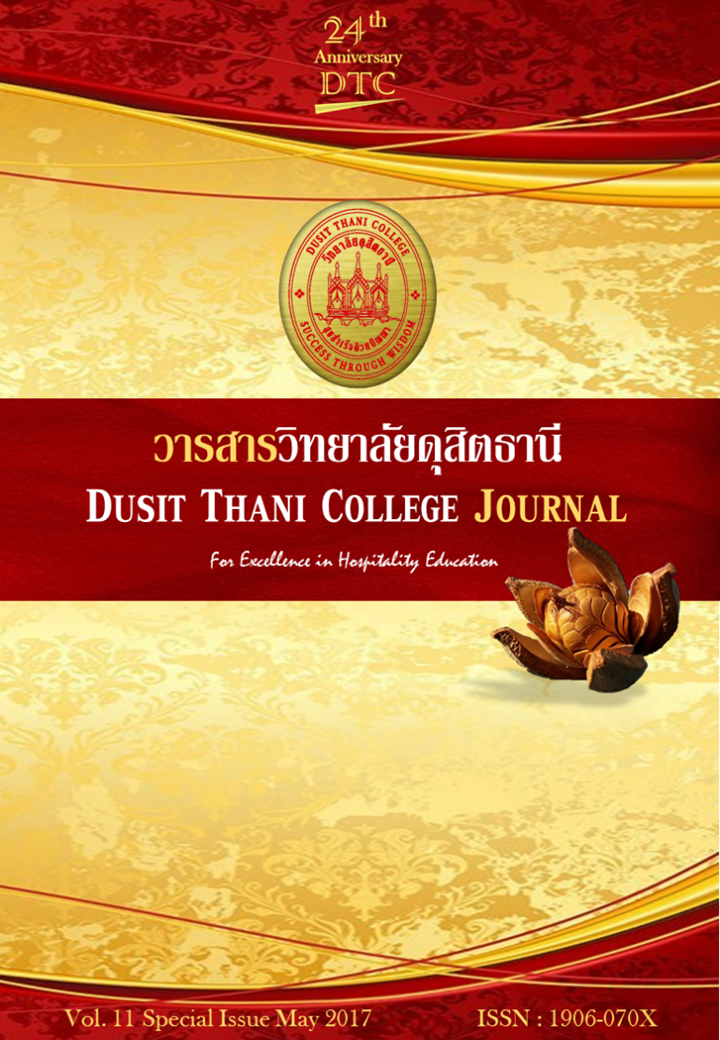Variety Travel’s Practice Guidelines for A Tourism Radio Host
Main Article Content
Abstract
The purpose of this paper war to explore tourism radio programming through Variety Travel’s radio personality by means of a narrative approach. The main participant for this study is Mr.Pipat Poungpool, one of the Variety Travel’s radio personalities. The author conducted qualitative research methods, using in-dept and semi-structured interviews to collect background and open science data and analysis through grounded theory. Results show that Mr.Pipat Poungpool, after graduating with a Bachelor’s degree, sought a career in magazine and event managements. He began work in the spotlight at the age of 22 as an account executive for Inspire Entertainment. Being a “travel buff” himself, after having listened to a FM99 tourism show, he then had an interest in studying and pursing a radio and television broadcasting career. He later became a radio personality for Variety Travel broadcasting on FM99 Active Radio. Having a desire to create a laid-back, fun, and easy-listening tourism radio show, he purposes that the personalities have to be perfectly compatible and have great chemistry when delivering content during the show which is planned weekly in advance. The contents for the show contain those needed by sponsors, insights, speculations, and sometimes – exclusive information that official tourism authority needs to put out. Moreover, there are particulars supporting popularity boost and sustainability in tourism consisting of tourism calendars, routes, activities, and attractions. The majority of an audience is connected to a show’s famous special guest or those ordinary wanderlusts. Thus, they plan their own travel schedule based on the show via available platforms such as radio, SMS, or a Facebook fan page. However, the limitation was discovered that the personalities and higher-ranking executives can acquire different perspectives and visions leading to undesired programming adjustment and a lack of an individual’s identity and trademark for their own work. Therefore, an approach can be delivered by introducing the show’s other new platforms. For example, television broadcasting and live radio programming can be very well received.
Article Details
Article Screening Policy
- All research and academic articles to be published must be considered and screened by three peer reviews in the relevant field / article.
- All articles, texts, illustrations and tables published in the journal are the personal opinions of the authors. Editors don't always have to agree. And no responsibility whatsoever is the sole responsibility of the author.
- The articles to be published must never be published. Where did you first publish? And not in the consideration of other journals If the audit found that there has been a duplicate publication It is the sole responsibility of the author.
- Any article that the reader sees as being plagiarized or impersonated without reference. Or mislead the work of the author Please let the journal editor know it will be your greatest blessing.
References
Chulalongkorn University Press.
Chuchuex, Ratana. (2005). The role of the radio program on the conservation of green areas in Bangkok. M.SC. Kasetsart University.
Fongrith, Metta. (2013). Switching between English and French languages, Thailand Thailand's Northeastern radio. Municipalities KhonKaen. Master of Arts Thesis Khonkaen University
Ministry of Tourism and Sports. (2015). TheThailand Tourism Strategy 2015-2017.
Nation. (2012). Trend market. Searched on 10 August 2016. accessible. https://www.prachachat.net
Pholphanich,Jaruwan.(2013). Radio affecting the perception and attitude of listening to the radio in Bangkok. MBA University of Eastern Asia.
Rodkhamdi,Chumphol. (2009). Manual radio for children. Bangkok: Pinto Phablichching.
Thailand language for communication. (2013). The role and function of the radio and television broadcasting. Searched on 12 August 2016. accessible. https://www.ipesp.ac.th
Wanaruemol, Theeraphat. (2011). The style and technique of radio. Faculty of Journalism Chiang Mai University.


